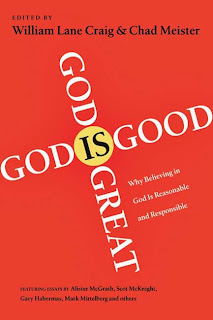Of all the characters in the Bible, I think the one I most identify with is Jeremiah. He was a malcontent. He complained to God all the time. His melancholy weighs heavily on his writings. And yet he was passionate, and the word of God was like a fire inside of him, burning him up from within. He tried to shut up. He tried to walk away. He tried to get out. But he couldn't. He was compelled by the word that God had planted deep within his soul.
God has a peculiar way of speaking to people like that: He asks them questions. I don't mean silly little questions like, "Hey, how's the weather down there?" I mean incisive, stop-you-in-your-tracks-and-shut-you-up kind of questions. Sometimes that's the only way to get us to stop complaining or feeling sorry for ourselves.
In chapter 12, Jeremiah offers this complaint to God:
1
You are always righteous, O LORD,
when I bring a case before you.
Yet I would speak with you about your justice:
Why does the way of the wicked prosper?
Why do all the faithless live at ease?
2
You have planted them, and they have taken root;
they grow and bear fruit.
You are always on their lips
but far from their hearts.
3
Yet you know me, O LORD;
you see me and test my thoughts about you.
Drag them off like sheep to be butchered!
Set them apart for the day of slaughter!
4
How long will the land lie parched
and the grass in every field be withered?
Because those who live in it are wicked,
the animals and birds have perished.
Moreover, the people are saying,
"He will not see what happens to us."
Jeremiah's all upset because these wicked folks, who only pay lip service to God, are living great lives. They don't have any problem paying the bills! They've got the 3,000 square foot house in the safe neighborhood. Their kids get to go to private school. They drive the best cars. They've got all the new toys. Meanwhile, I'm stuck back here in the ghetto! There's crime all over the place. My kids go to a bad school. My car's held together with duct tape. But you know me! You know I'm legit! I'm true. I don't mess around with you. I live it, I believe it, I say it and I pray it. Oh I know you're righteous God, but you need a little help with your justice.
Have you been there? Feeling sorry for yourself because your life is hard? Because you're poor? Because God seems to be coming through for everyone but you? I've been there. That's an easy place for me to get to, let me tell you.
What do you expect God to say to you in those times? "Don't worry, just be patient. I've got it all taken care of. I'm sovereign. I'm in control. I own the cattle on a thousand hills. I've never seen the righteous forsaken, or their children begging bread. I will provide for all your needs." All good things, right? Comfort in our time of need. But I bet you'd never expect to hear God say this:
5
"If you have raced with men on foot
and they have worn you out,
how can you compete with horses?
If you stumble in safe country,
how will you manage in the thickets by the Jordan?
And all God's children said, "Oh, snap!" Whenever you complain to God, get ready for him to ask you a question that will absolutely tear you in half. And yet, within the verbal beatdown, God is calling Jeremiah (and you and me) to something higher--something far greater than this present rat race.
You see, Jeremiah had been running the wrong race. He looked around him and saw other men, mere humans, and they were leaving him in their dust. But God did not call Jeremiah to run against men. He called him to run against horses.
If you're bitter, or frustrated, or disappointed with God that your life has not turned out like you thought, it's because you're running in the wrong race. God hasn't called you to run against men. God has called you to run with horses. He has called you to a far more difficult task--an impossible race. He has given you something to do that you can't possibly do on your own. If you think the task God has given you is manageable, then you're not thinking big enough. You're supposed to run with horses. And win.
Here's the gameplan. (And this one has to come from Isaiah, because Jeremiah is just too cynical to ever think like this.)
Those who hope in the LORD
will renew their strength.
They will soar on wings like eagles;
they will run and not grow weary,
they will walk and not be faint.
Put your hope in the Lord, and only in the Lord, and you can run with the horses. Don't put your hope in the things you want, even the good things. Don't hope for a better life. Don't hope for a more effective ministry. Don't hope for more money. Don't even hope for justice! If you hope for anything but God you'll be running the wrong race, and you will get worn out. But if you put your hope in God, and only in God, not even the horses will be able to keep up with you.






+copy.jpg)
+copy.jpg)
+copy.jpg)
+copy.jpg)
+copy.jpg)

